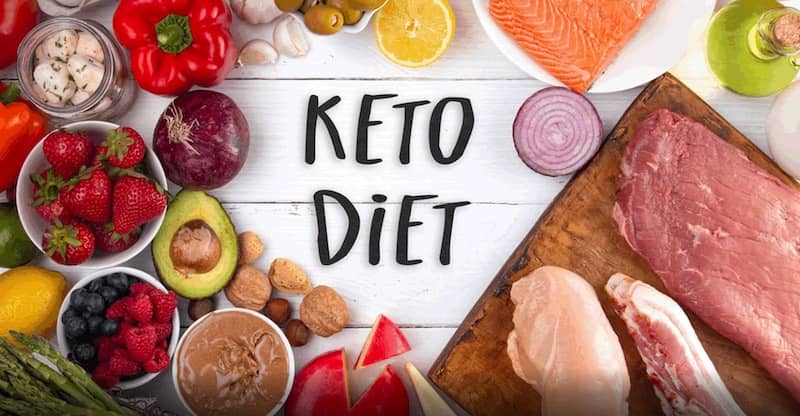
BLOG
Can A Ketogenic Diet Help You Lose Weight?

What is a ketogenic diet?
According to the research, a ketogenic diet is defined as a diet that restricts carbohydrate intake to around 50g per day (about 50-150g of carbohydrates is generally defined as ‘low carbohydrate’). A ketogenic diet is not, however, set in stone and can have varying degrees of protein and dietary fat intakes.
When carbohydrates are restricted to around 50g or less per day, most people start producing high levels of ketone bodies. These are simply breakdown products of fat and are used to fuel cells that normally depend on glucose.
Ketosis takes place when your body lacks carbohydrates as a primary fuel source, not because dietary fat intake is high!
Is a ketogenic diet good for fat loss?
A change in body tissue mass is most closely related to energy balance over time. As such, a ketogenic diet is one viable method to initiate fat loss if it leads to a prolonged energy/calorie deficit over time.
One of the many reasons a ketogenic diet can be a successful fat loss option is due to the improvement in overall diet composition that often occurs, leading to a reduction in hyper-palatable junk-foods that are easy to overconsume – for example, chocolate, cakes, pastries, pizza. As an aside, all the foods mentioned contain dietary fat too!
Additionally, consuming fewer carbs may have the added benefit of increasing total dietary protein intake. Increasing protein intake can lead to a spontaneous reduction in total calories, creating an energy imbalance. As a result, fat loss shortly ensues.
Finally, a ketogenic diet can have appetite-suppressing effects, decreasing hunger and desire to eat. Despite it being a viable method for many to lose body fat, it is not superior to other diets, particularly once protein intake is matched.
Note: while a ketogenic diet may mean you are burning more fat for fuel, it does not necessarily mean we are burning the fat that is stored in our fat tissue and thus losing body fat. So, yes, although you do burn more fat on a high-fat diet, you have more of it to burn due to the increase in dietary fat.
A classic study by Hall and colleagues in a tightly controlled setting, showed that carbohydrate restriction was not physiologically advantageous for fat loss. The study took place in a metabolic ward and looked to compare the effect of different carbohydrate and fat intakes on energy intake, output, and substrate balance while holding calories and protein constant during hypocaloric conditions (30% energy deficit). Interestingly, net fat balance was reduced to a greater extent in the restricted fat group i.e. subjects who restricted fat intake lost more body fat, albeit a pretty tiny 36g/day.
Can a ketogenic diet help you gain muscle?
A recent meta-analysis assessed the effects of ketogenic diets on a number of body composition outcomes (one of which included gains in lean mass) in weightlifters. Compared to non-ketogenic diets, a ketogenic diet led to greater losses in lean mass (-1.26 kg).
It’s important to acknowledge that lean mass results were likely impacted by glycogen-related changes in water weight. For every 1g of carbohydrate stored in the body as muscle or liver glycogen, we also store 3g of water. This is part of the reason keto dieters lose dramatic weight at the start of their diet!
That said, these results match up with other studies suggesting that ketogenic diets may lead to less gain in strength and muscle mass when compared to non-ketogenic diets. It is absolutely possible for individuals to make fantastic gains in muscle mass on a ketogenic diet, it’s just likely not the ‘best’ diet to build and/or maintain muscle.
Is a ketogenic diet worth it?
The truth is that cutting carbohydrate can be a suitable fat loss strategy for some who struggle with hunger management and like simple rules put in place, or who simply find it preferable to restrict carbohydrate-rich foods in comparison to dietary fat-rich foods.
If, however, drastically reducing your carbohydrate intake negatively affects your performance, makes you feel miserable, tired and moody, perhaps you should consider alternative options.
To summarise, adherence to your diet will be the make or break of your fat loss success and it’s also the biggest predictor for long-term weight maintenance. Dietary interventions that optimise adherence should be the primary focus for anyone looking to lose body fat. An individualised approach is often best!
A ketogenic diet is simply a tool in the fat loss arsenal and can work wonders for some. Is it an absolute necessity for fat loss success for everyone, in every situation? Definitely not.
Kevin Garde
Nutritionist and Bodyscan Consultant


Leave a Reply
You must be logged in to post a comment.